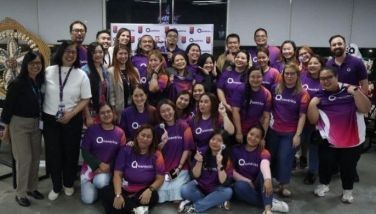Marilou Diaz-Abaya, 57
Was it Randy David or Boogie Lim who introduced Orly and me to her? Did we first meet her in Japan or back in the Philippines?
Cousin Boogie met Marilou during their student days in the States. Randy David had his TV shows which discussed relevant issues to be understood and reflected upon by a wider audience of Filipinos. Marilou was a very active partner of Randy for these shows. She was dedicated to share her gifts of directing and film-making with our people.
That is how our paths met.
Then Philippine Ambassador to Japan, Ramon del Rosario, commissioned us to research on our Filipino entertainers in Japan. He personally wanted to understand why thousands of them came to Japan, despite all the trials and challenges, even death, like the much-publicized death of Maricris Sioson which became a bilateral problem then. He wanted the research results to be made into a movie to educate our women about the real situation in Japan.
With her very sensitive and committed style of film-making, Marilou was our first choice to direct the movie. Even while we were doing the research, Marilou advised us to put in all the details that would transport our readers to the inner world of the entertainers who wanted their voices to be heard. To paraphrase Marilou’s advice, “bring out all the colors, the sights, the sounds, the smell – bring the audience to where the entertainers were during your interviews.” In short, guide the audience and allow them to know the entertainers as total persons within their world in Japan.
Our joint production did not push through though. Separately, we proceeded our own way but we were joined together still by our joint desire to serve the Lord and people.
The book “Filipino Entertainers in Japan: An Introduction,” was published, thanks to the kindness of historian and publisher, Renato Constantino and was translated and published in Japanese as well, through Akashi Shoten. In its own way, the book affected policy to better protect our entertainers and our migrants in Japan. That research also opened a new path for me, from agrarian reform, towards gender and migration studies.
Marilou, on the other hand, continued to soar to higher heights, reaping awards upon awards like the 2001 Arts and Culture Prize of the Fukuoka Asian Culture Prizes, “a highly prized honor awarded to Asians who have distinguished themselves in the field of culture.” Marilou was cited for “her works which blended entertainment, social consciousness, and ethnic awareness” and were shown both locally and internationally.
Filipinos will remember Marilou for her 1998 masterpiece “Jose Rizal.” I still have to personally view her film-and-video exhibit “Empire and Memory” about the 1899 Philippine-American War.
When we first met her, she was already an award winner but she came across as a very sincere, vibrant person eager to listen and just as eager to share her enthusiastic views about issues, especially about how to reach and assist our own people.
Years later, Randy told us about her active involvement in teaching, in sharing her skills for film-making (she founded and was president of the Marilou Diaz-Abaya Film Institute and Arts Center and she also taught about filming at the Ateneo de Manila University). We remembered that Randy also shared that she was actively trying to battle her cancer which she never allowed to stop her from continuing to share her gifts with as many that she could share with.
At 57, Marilou joined the Lord last October 8. I see her face now, smiling and peaceful, basking in the presence and love of the Lord, her reward for having lived a life fully shared with and for God and others.
Thank you and rest in peace, Marilou. It was our joy and honor to have met you.
***
Email: cherry_thefreeman@yahoo.com
- Latest
- Trending































